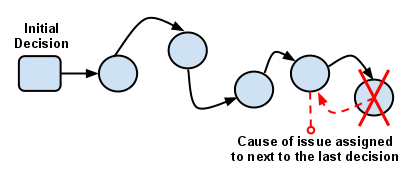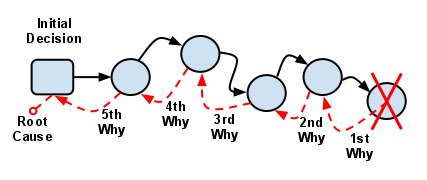As part of my formal education, root cause analysis was not only taught but also stressed throughout the technical phase of my career. When I began grappling with organizational issues I discovered that the root causes of issues were not necessarily the focal point of decision making. “Don’t confuse the facts with reality” was a frequent experience. Why does management often forgo root cause analysis? What are the consequences?
The Shell Game
Unlike the technology and science realms that deal far more with concrete facts and inanimate objects, the management world operates in a more social realm where position, politics and perception have significant impact on outcomes. It took years to make the transition from one to the other – not that technology and science are politic-free – but we’re political amateurs compared to the management realm!
 In our consulting practice we frequently find ourselves counseling senior technologists on how to successfully move ideas through a political landscape. On the contrary, counsel to management leadership is often focused on getting to the root cause and making difficult decisions in the face of pragmatic and difficult political realities.
In our consulting practice we frequently find ourselves counseling senior technologists on how to successfully move ideas through a political landscape. On the contrary, counsel to management leadership is often focused on getting to the root cause and making difficult decisions in the face of pragmatic and difficult political realities.
In situations gone awry, we often see the next to last decision (and its decision maker) blamed for the failure. While it may seem management has a short memory in this circumstance, that is not so much the case. Typically the most vulnerable person in the organization has made the mistake of participating in something that has gone askew and is left without a chair when the music stops. Often the politically vulnerable person is pasted with the failure and removed while the rest of the management team attempts to chart a different course.
Ultimately the shell game of avoiding root cause never arrives to any good place, including when senior leadership brushes up resumes and moves on before the train wreck. In such a situation, management effectively played a shell game whose goal was not to get to the root cause, but rather to assure a political win.
Root Cause Analysis with The 5 Why’s
Toyota has consistently built the highest quality cars in the world market. This is no small feat, given that the modern automobile is considered the most complex consumer mass produced item made today. One technique developed at Toyota is the 5 Why’s. This technique is at the heart of Toyota’s problem solving methodology. It can be simply applied in any business setting.
The problem: Our sales pipeline is providing leads which are not converting to sales.
Why? The operational staff is not delivering services quickly enough to close the sale.
Why? Our staff generally lacks skill in closing deals.
Why? We have misunderstood our needs and have hired incorrectly.
Why? Our operational leader has not made effective choices in staff and operations strategy.
Why? Our operational leader has never run an organization which receives leads and is expected to close sales.
Potential Solutions:
- Assess potential for leader to train and better prepare.
- Hire a consultant experienced in operational sales to help chart a new path with the leader.
- Establish performance rewards aligning learning adjustments necessary for the operational team.
If we had stopped at the first, second or even third “why”, we might have started firing people and played the expensive game of hiring, expending existing staffs’ time training new people only to discover we are right back where we started.








You must be logged in to post a comment.